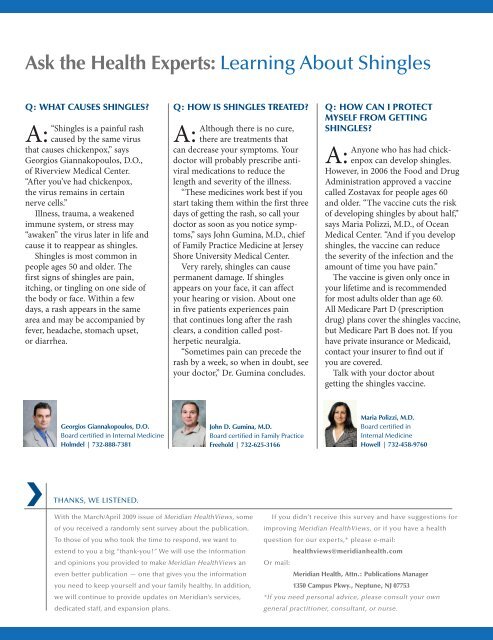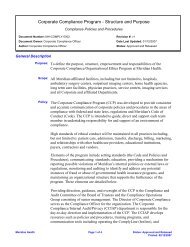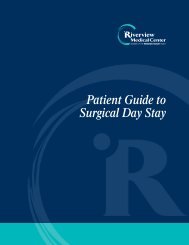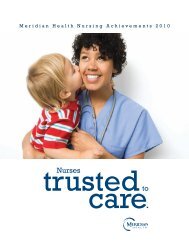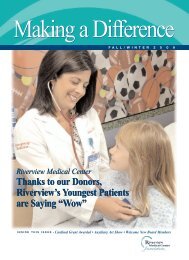Download the November/December 2009 issue - Riverview Medical ...
Download the November/December 2009 issue - Riverview Medical ...
Download the November/December 2009 issue - Riverview Medical ...
Create successful ePaper yourself
Turn your PDF publications into a flip-book with our unique Google optimized e-Paper software.
Ask <strong>the</strong> Health Experts: Learning About Shingles<br />
Q: What causes shingles?<br />
A:<br />
“Shingles is a painful rash<br />
caused by <strong>the</strong> same virus<br />
that causes chickenpox,” says<br />
Georgios Giannakopoulos, D.O.,<br />
of <strong>Riverview</strong> <strong>Medical</strong> Center.<br />
“After you’ve had chickenpox,<br />
<strong>the</strong> virus remains in certain<br />
nerve cells.”<br />
Illness, trauma, a weakened<br />
immune system, or stress may<br />
“awaken” <strong>the</strong> virus later in life and<br />
cause it to reappear as shingles.<br />
Shingles is most common in<br />
people ages 50 and older. The<br />
first signs of shingles are pain,<br />
itching, or tingling on one side of<br />
<strong>the</strong> body or face. Within a few<br />
days, a rash appears in <strong>the</strong> same<br />
area and may be accompanied by<br />
fever, headache, stomach upset,<br />
or diarrhea.<br />
Q: How is shingles treated?<br />
A:<br />
Although <strong>the</strong>re is no cure,<br />
<strong>the</strong>re are treatments that<br />
can decrease your symptoms. Your<br />
doctor will probably prescribe antiviral<br />
medications to reduce <strong>the</strong><br />
length and severity of <strong>the</strong> illness.<br />
“These medicines work best if you<br />
start taking <strong>the</strong>m within <strong>the</strong> first three<br />
days of getting <strong>the</strong> rash, so call your<br />
doctor as soon as you notice symptoms,”<br />
says John Gumina, M.D., chief<br />
of Family Practice Medicine at Jersey<br />
Shore University <strong>Medical</strong> Center.<br />
Very rarely, shingles can cause<br />
permanent damage. If shingles<br />
appears on your face, it can affect<br />
your hearing or vision. About one<br />
in five patients experiences pain<br />
that continues long after <strong>the</strong> rash<br />
clears, a condition called pos<strong>the</strong>rpetic<br />
neuralgia.<br />
“Sometimes pain can precede <strong>the</strong><br />
rash by a week, so when in doubt, see<br />
your doctor,” Dr. Gumina concludes.<br />
Q: How can I protect<br />
myself from getting<br />
shingles?<br />
A:<br />
Anyone who has had chickenpox<br />
can develop shingles.<br />
However, in 2006 <strong>the</strong> Food and Drug<br />
Administration approved a vaccine<br />
called Zostavax for people ages 60<br />
and older. “The vaccine cuts <strong>the</strong> risk<br />
of developing shingles by about half,”<br />
says Maria Polizzi, M.D., of Ocean<br />
<strong>Medical</strong> Center. “And if you develop<br />
shingles, <strong>the</strong> vaccine can reduce<br />
<strong>the</strong> severity of <strong>the</strong> infection and <strong>the</strong><br />
amount of time you have pain.”<br />
The vaccine is given only once in<br />
your lifetime and is recommended<br />
for most adults older than age 60.<br />
All Medicare Part D (prescription<br />
drug) plans cover <strong>the</strong> shingles vaccine,<br />
but Medicare Part B does not. If you<br />
have private insurance or Medicaid,<br />
contact your insurer to find out if<br />
you are covered.<br />
Talk with your doctor about<br />
getting <strong>the</strong> shingles vaccine.<br />
Georgios Giannakopoulos, D.O.<br />
Board certified in Internal Medicine<br />
Holmdel | 732-888-7381<br />
John D. Gumina, M.D.<br />
Board certified in Family Practice<br />
Freehold | 732-625-3166<br />
Maria Polizzi, M.D.<br />
Board certified in<br />
Internal Medicine<br />
Howell | 732-458-9760<br />
❯<br />
Thanks,<br />
we listened.<br />
With <strong>the</strong> March/April <strong>2009</strong> <strong>issue</strong> of Meridian HealthViews, some<br />
of you received a randomly sent survey about <strong>the</strong> publication.<br />
To those of you who took <strong>the</strong> time to respond, we want to<br />
extend to you a big “thank-you!” We will use <strong>the</strong> information<br />
and opinions you provided to make Meridian HealthViews an<br />
even better publication — one that gives you <strong>the</strong> information<br />
you need to keep yourself and your family healthy. In addition,<br />
we will continue to provide updates on Meridian’s services,<br />
dedicated staff, and expansion plans.<br />
If you didn’t receive this survey and have suggestions for<br />
improving Meridian HealthViews, or if you have a health<br />
question for our experts,* please e-mail:<br />
healthviews@meridianhealth.com<br />
Or mail:<br />
Meridian Health, Attn.: Publications Manager<br />
1350 Campus Pkwy., Neptune, NJ 07753<br />
*If you need personal advice, please consult your own<br />
general practitioner, consultant, or nurse.


